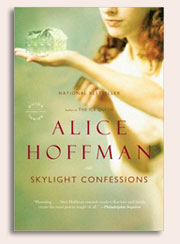'People are haunted because they want to be'

Reviewed: Skylight Confessions, by Alice Hoffman, Little, Brown and Company, 2007, 262 pages.
I've read a lot of Alice Hoffman (prolific author of 18 novels). She has a way of pulling you into stories that touch on the supernatural but are grounded in reality. Skylight Confessions is no exception. It's the story of a couple of generations of New Englanders, none of them quite happy or fulfilled.
The book starts with young Arlie, not even 17, who finds her destiny following her ferry-boat captain father's death. She seduces a young stranger and seals her fate. Soon, Arlie is a mom and wife trapped behind the transparent boundaries of a famous house called 'The Glass Slipper,' an imposing architectural wonder made entirely of glass and with glass ceilings.
That's where the title comes in, and the end of the book reveals some of the secrets/truths of Arlie and her family. Her distant husband John who seems to resent her for seducing him late one foggy night when he got lost on the way to a party and ended up in her bed.
Their son, Sam, becomes a slave to heroin early on. Her daughter, Blanca, never knows a mother's love and eventually physically escapes across the pond but her own happiness remains elusive. Their nanny of sorts, Meridith, brings a fresh twist to the story and another union that seems to come straight from the fates.
Death before one's time, addiction, emotional distance play along with themes of true love, passion, yearning in this engrossing tale.
"People are haunted because they want to be," says Merrie's husband at one point. And it seems to be true. John Moody is haunted no matter where he goes by the spectre of his beautiful young wife, someone he never seemed to fully appreciate. She lingers about in a diaphanous white dress, her signature long red hair loose, her lips silent. She doesn't reprimand and isn't there as a fright. She's just there. Because he can't let her go. Meanwhile, dishes in the house break and crack at random and ash pours off the roof. Birds get trapped inexplicably inside the house. Her presence is felt by everyone there.
It won't take you long to read and may keep you up past your bedtime (but in a good way).
Thanks, Brandie, for loaning this to me even before you read it yourself!
Labels: Alice Hoffman, best fiction of 2008, Skylight Confessions
 RSS
RSS



